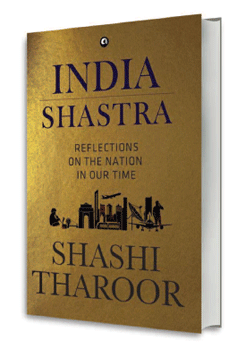 One can almost imagine Shashi Tharoor sitting with a glint in his eye and a smile on his face, as he narrates his experiences
One can almost imagine Shashi Tharoor sitting with a glint in his eye and a smile on his face, as he narrates his experiences
After fAlling agonizingly short in his attempt to be the United Nations’ Secretary General in the 2006 elections, Dr Shashi Tharoor ended his 29- year-long stint with the UN as a career diplomat, and slowly edged his way into Indian politics. A refreshing change from the typical Indian politician, it was quite easy to see why Tharoor was instantly adored by the Indian middle class and despite his somewhat elitist appeal, his easy smile and suave demeanour made him a favourite on all television channels for any matter worth debating.
Tharoor’s own personality is unerringly on display in his latest book — India Shastra: Reflections on the Nation in our Time — a collection of 100 essays that have been amalgamated from his day-today writings for various publications.
The book is divided into eight segments, the first two of which are largely dedicated to Modi-bashing.
If any doubts remained whether Tharoor was a secret admirer of the current Indian prime minister, these are quickly laid to rest in the first 22 essays, most of which lay thick into Narendra Modi, predominantly criticising him for being a man who talks big, but has achieved little in his first year in office.
The third section of Tharoor’s book, titled “The Legacy” is easily the best part of his book. In addition to taking every available potshot at the British Empire, Tharoor also eulogises Gandhiji, Sardar Patel, Swami Vivekananda and Rabindranath Tagore. The second half of this section becomes a bit of a Congress sales pitch, but the superb quality of storytelling make up for any disappointment the reader might have felt thus far. His story on Tagore in particular is arguably his best essay in the entire book.
Section IV — Ideas of India — is another interesting read since it looks at Indian politics largely from an impartial standpoint, and examines our democratic system in a scholarly fashion. Section V — The Pursuit of Excellence — is also expertly written, with his chapter on the education system in particular a must-read for anyone who wishes to express an opinion on the subject.
The second half of Tharoor’s book is filled with anecdotes and personal experiences, most of which enrich the message he is attempting to convey. While there is undoubtedly a pro-Congress tinge to the book, his knowledge of diverse subjects and an unerring desire to express an opinion (or two), makes it an enjoyable read even for those who aren’t necessarily fans of his political party.
Barring the odd need to pick up a dictionary, Tharoor’s book is an easy read, filled with wit and humour, and one can almost imagine him sitting there with a glint in his eye and a smile on his face as he narrates his experiences.
